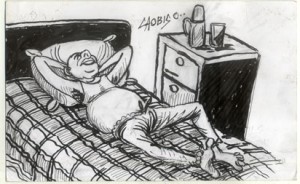
I missed the opening of the Rio Olympics. I was told by those who watched it that it was a spectacular, not-to-be-missed event. But I was, unfortunately, shuttling planes and airports and was more concerned at that time with getting self and baggage to the next destination safely.
In the process, I also missed the first game of the dream team which it won handily despite the match being played within hours of the team’s arrival in Rio. That feat demonstrated the power of the spirit over physical limitations.
The consequence of these was that I was determined to watch the closing ceremony and as many of the dream team’s matches as I possibly could.
So I watched the team’s defeat to Germany in a match I felt the team played below par and exposed its technical deficiencies. The result was therefore, a fair assessment of what was on display on the night. I also watched the team’s win over Honduras in a match where grit and skill masked technical limitations and where lack of sustained focus and mental staying power almost cost us dearly. But the bronze medal was a just reward for a team that was left for dead by its own officials —talk of a rejected stone becoming the pillar of the house. Then came the time for the closing ceremony.
I was of two minds. A part of me did not want to miss what could be a heart-stopping show.
But the more emotional, more human part of me didn’t want to witness the parade of the athletes. I knew from previous Olympics, that the parades would be led by athletes who had won the highest medals for their countries.
How could I bear to see my country come out with only a bronze medal in a contingent as large as ours? Where much smaller contingents proudly displayed more medals. It was hard to take the glittering display of medals from the American contingent.
Their gait was confident, their looks triumphant. They had topped the table once again. And it was impossible not to look away when little Kenya danced pass with their gold, silver and bronze medals. In fact, Nigeria, the giant of Africa, was 11th on the African medal table and could easily have been last! How much lower can we sink before we start picking ourselves up? As the athletes danced in the rain which many called showers of blessing, I tried in vain to see the Nigerian flag and was secretly glad it was not in open display. I couldn’t imagine what the commentators would say if the camera was focused on us.
They would definitely compare the size of the contingent with the number of medals we won.
They probably would mention the plight of the only sport that won us a medal.
Would the team—and the officials be dancing or would they hang their heads? After all, it is said that the joy of Olympics is in participating. But watching the other countries strut their stuff and display their medals leaves a taste of ashes in the mouth; knowing especially, that we could have done better, much better.
The only thing I can liken to what I felt that evening is to imagine when you are invited by your children’s school to its prize-giving day. You watch shamefaced and embarrassed while your neighbours on your left and right smile when their children are called to the podium for different awards of academic excellence—two for one and three for the other—and not a mention is made of your four children. Your wish at a point would be to become anonymous if you could not literally disappear. Obviously the last thing you would want at this time is for one of your children to be called out for something shady or sloppy.
Or to be named the dirty Jim of the class. There would be many emotions on the night as the closing ceremony was being beamed round the world. Many countries would watch their athletes as they danced pass with pride; but some would do so with shame especially if the athletes had taken drugs or tried to beat the gun, or like ours, their athletes performed well below expectation. Those who won medals would themselves feel a sense of fulfilment as would those who surpassed their personal best. Those who under-achieved or had last minute injuries would curse their luck. Win or lose, those who had prepared well and had given their all, would feel some innate joy while those who refused to make hay while the sun was shining would have nobody but themselves to blame.
The talents are there in abundance. But they need to be spotted, moulded, guided, inspired and exposed. It is not always about money—otherwise poorer countries would not be winning medals ahead of us. It is about planning, diligence and the setting of priorities and goals. We are members of about 24 of the 28 Olympics sports. Are we just there to make the numbers or are we out to make a difference? It may be that we need to trim the number and concentrate on those we have the facilities and coaches for. It is easy to identify them from our performance in recent meets. Those that show promise should be funded and encouraged to do more while those that seem to have no clue from their outings should be disbanded. For too long we have been a micro-wave country. We expect piping-hot food without wanting to go through the normal process of preparing food. But those who cut corners by boiling rice, boiling yam and making eba through micro-wave must know that they will not always get it right. And worse, it could blow up in their faces. Let us shun the micro-wave approach and become a country of process and structures. And not only in our sports.
END

Be the first to comment